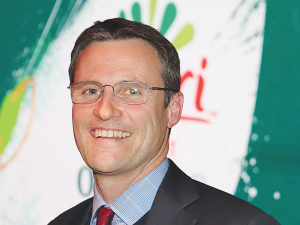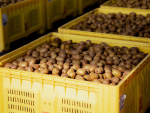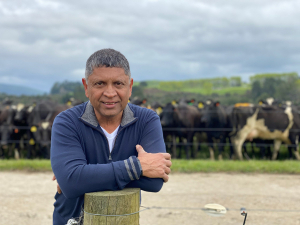"We have to think a bit differently now."
That's the word from Zespri chief executive Dan Mathieson, who says the industry is facing unprecedented challenges because of the lack of people available to work in the sector as a result of the Covid pandemic.
Mathieson says the situation is likely to be around for some time and the sector has to think about how else it can make different decisions that free up capacity and jobs that people have been doing but don't need to do in the future.
"That's a decision we are making across the entire supply chain. For example, we are looking at how we can pack our fruit in different ways and times that it makes it easier to go across the supply chain," he told Rural News.
"We are looking at the way we can incentivise our growers on taste and how we can bring fruit forward in the season - so that we can fill that early bit in the year. Our philosophy is to question and challenge decisions to make sure there isn't a better way through this next period when we won't have enough people."
Mathieson says Zespri has got a team dedicated to finding new solutions for the future and helping to coordinate an outreach for the whole industry. He says this includes growers and packhouse owners.
Labour and logistics are by far the biggest challenges facing the kiwifruit industry in the Covid environment. Mathieson says this is the same for the entire primary sector.
He says before the Covid outbreak, it was pleasing to see the Government announce that it was going to increase the number of RSE workers from the Pacific Islands allowed into NZ. He adds, if this happens, it will really help.
Mathieson says the aim is to find more innovative solutions to bring peiple in this year to prepare for the 2022 season. Then to pick, pack and manage that fruit well - "so we can maintain our quality standards and product off to customers around the world".
Aside of overseas workers, Mathieson says Zespri continues to put a lot of effort into encouraging New Zealanders to work in the kiwifruit industry. He claims the sector has a good track record in this area.
"At the onset of Covid, we were able to tap into those industries that had workers who lost their jobs," he told Rural News.
"We were able to bring many of these workers into the kiwifruit sector and offer them employment. We will be doing the same this year and we'll also work with tertiary institutes to see if there are young people who can come out during their holiday breaks and work in the kiwifruit industry."
Mathieson says they are also targeting retirees who might be looking for something to do. He also adds that Zespri believes there are real opportunities to adjust the way packhouses operate through the next year.











